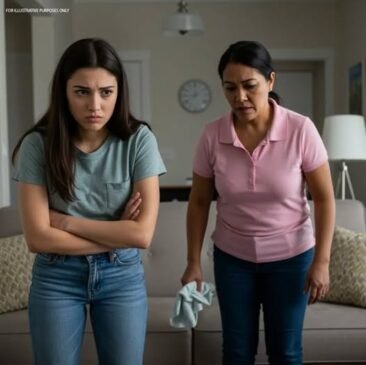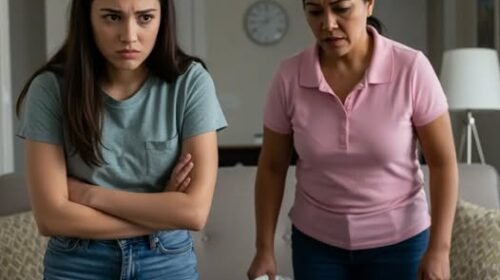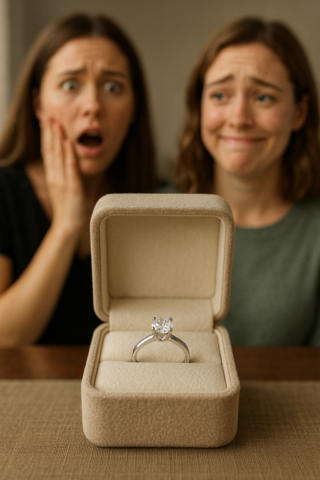A daughter abandoned at birth by her mother finds her years later, unaware that she is the same child she once left behind. This heart-wrenching story of pain, betrayal, and unexpected reunions becomes a journey of forgiveness and self-discovery.
What is a child without roots? Nothing but a shadow, drifting through time, desperately seeking meaning in their existence.
“Does that mean you’ve always felt like a ghost?” Miller asked, his voice laced with genuine curiosity, as he stirred his coffee in my modern kitchen.
I met his gaze, my only friend, the one who had helped me uncover the painful truth. He knew every detail of my story—the story of a woman discarded by the one person who should have cherished her most. A woman who had come from nothing, only to rise on her own.
For years, I carried the burden of abandonment, trying to piece together the parts of myself that she had taken with her when she left. The note she left with me, pinned to a cheap blanket, read simply: “Forgive me.”
It was the only thing she ever gave me.
I remember the first day Luna Petrick and Gilla Smith found me. I was a baby, just a bundle of life, crying for someone to hold me. They were an elderly childless couple who found me on their doorstep one early October morning. They didn’t send me to an orphanage, but they didn’t love me either. They simply did what was expected of them.
“You’re in our home, Sandara,” Luna would say every year on the day they found me. “But remember—we’re strangers to you, and you to us. We’re just fulfilling a human duty.”
Their apartment, though warm, became my cage. I ate their cold leftovers, was given a corner of the hallway to sleep in, and my clothes were always too big and secondhand. I wasn’t theirs, and they weren’t mine.
At school, I was an outcast, taunted with names like “foundling,” “stray,” and “nameless.” The loneliness was suffocating, but I didn’t cry. I didn’t have the luxury of tears. Instead, I focused on survival—strength, rage, and determination, all mixed into a force that drove me forward.
By the age of thirteen, I was working. Handing out flyers, walking dogs, earning every penny with my own hands. When I saved up, I hid the money in a crack between the floorboards. But Luna found it one day.
“Stealing?” she asked, holding up the crumpled bills. “I knew it. The apple doesn’t fall far from the tree…”
“It’s mine. I earned it,” I replied, my voice steady despite the hurt.

She threw the money on the table. “Then you’ll pay. For food. For living here. You’re old enough.”
By the time I turned seventeen, I had earned my way into university. I left with just a backpack and a box—my only connection to the past: a baby photo taken by a nurse before the woman who called herself my mother took me from the hospital.
In the dorm, I struggled. I worked nights at a 24-hour store to support myself, and my classmates laughed at my worn clothes. But I didn’t care. I only heard the voice inside me: I’ll find her. I’ll show her who she threw away.
It wasn’t long before Miller, the only person who knew my story, offered to help. He was a private detective, and he helped me search for the woman who had abandoned me. After years of dead ends and false leads, he found her: Irene Millerovna. She was 47, divorced, and struggling to survive on odd jobs. She had no children.
Miller’s words stung as I read the brief description of her life: “No children.” That was the line that hurt the most. I saw her photo, and I felt nothing. Her eyes were empty, devoid of the fire I had kept alive in myself.
Miller and I devised a plan. He posted a job ad for a housekeeper, and Irene responded. He interviewed her in my office, while I watched through a hidden camera. When she left, I picked up her passport from the table, the document of the woman who had abandoned me.
“Do you really want to keep going?” Miller asked, his voice cautious.
“Now more than ever,” I replied, determination hardening in my voice.
A week later, Irene started working as my housekeeper. I watched her clean my floors, dust my expensive trinkets, and wash my silk blouses. She was a ghost in my home. I barely spoke to her. I watched, always from a distance, studying her every movement.
Two months went by. Eight cleanings. And every time she left, I felt a strange emptiness. I noticed her staring at the photos on my walls, wondering if she saw a resemblance. Did she see the child she had abandoned all those years ago?
One day, I caught her looking at my graduation photo, her hands trembling as she dusted it. I couldn’t hold back any longer.
“See something familiar?” I asked, my voice sharp, stepping into the room.
She turned quickly, caught like a thief. Her face turned pale as she stammered, “Sandara Gennadievna… I didn’t mean to… I was just dusting.”
Tears welled in her eyes, and I couldn’t stop myself from asking the question that had haunted me all my life.
“Why? Why did you leave me?”
Her face crumpled, and she sank to her knees, sobbing. “I thought it would be better for you. I couldn’t take care of you. I thought someone else could.”
I laughed bitterly. “You thought strangers would love me? They raised me, but they never loved me.”
Her voice cracked. “I thought of you every day… every single day, for twenty-five years.”
In that moment, I realized that forgiveness didn’t come from the other person—it came from within me. I had carried the weight of resentment for so long, but I didn’t need to carry it anymore.
“I don’t want revenge,” I said softly, stepping away from her. “But there’s nothing to forgive either. You made your choice, and I’m making mine now.”
I walked to the window, my mind swirling with emotions. The city outside was alive, full of possibilities. I didn’t need to look back anymore.
The next day, I called Irene. I invited her to meet again. Not as a mother and daughter, but as two people who had suffered and learned to move on. We met once more, and this time, it was different. I wasn’t seeking closure anymore. I was simply seeking understanding.
Some things, I realized, don’t need to be fixed. But some things—like the bond between a mother and daughter—can only be healed if we allow ourselves to let go of the past.
And so, I did. I let go of the anger, and in return, I found peace.



